Understanding the timeline of Alzheimer’s degeneration can improve support for those affected, and researchers have now built a new ‘molecular clock’ to predict the onset of symptoms years in advance, using established blood markers.
Category: Alzheimer Treatment News
CBS News Sunday Morning: Promising clinical trials in Alzheimer’s prevention (Links to an external site)
In this national spotlight, CBS News chief medical correspondent Dr. Jon LaPook sits down with Randall J. Bateman, MD, to explore groundbreaking global clinical trials that are redefining the future of Alzheimer’s care — proving that continued research matters now more than ever.
Drug to slow Alzheimer’s well tolerated outside of clinical trial setting (Links to an external site)

In a recent study, researchers at WashU Medicine found adverse events were rare and manageable among clinic patients with very mild or mild Alzheimer’s disease who received lecanemab infusions at the Memory Diagnostic Center at WashU Medicine.
The unusual genetic inheritance that could change Alzheimer’s treatment (Links to an external site)

The genes of a Colombian woman who beat the odds might lead to a new way to tackle the disease.
Highly accurate blood test diagnoses Alzheimer’s disease, measures extent of dementia (Links to an external site)

A newly developed blood test for Alzheimer’s disease not only aids in the diagnosis of the neurodegenerative condition but also indicates how far it has progressed, according to a study by researchers at Washington University School of Medicine in St. Louis and Lund University in Sweden.
Anti-amyloid drug shows signs of preventing Alzheimer’s dementia (Links to an external site)

Clinical trial of people destined to develop early-onset Alzheimer’s disease shows eliminating amyloid from brain may prevent symptoms, supports need for confirmatory studies.
Researchers find a hint at how to delay Alzheimer’s symptoms. Now they have to prove it (Links to an external site)

An experimental treatment appears to delay Alzheimer’s symptoms in some people genetically destined to get the disease in their 40s or 50s, according to new findings from ongoing research now caught up in Trump administration funding delays.
$4.5 million supports pathbreaking neuroimmunology research (Links to an external site)

Washington University School of Medicine in St. Louis has received a three-year $4.5 million grant from the Carol and Gene Ludwig Family Foundation, aimed at advancing research on neuroimmunology and neurodegeneration with the ultimate goal of developing new treatments for Alzheimer’s disease.
Patient defies genetic fate to avoid Alzheimer’s (Links to an external site)
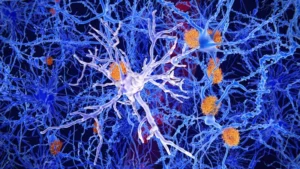
Doug Whitney, who lives near Seattle, Wash., inherited a mutation that has caused many family members to develop Alzheimer’s disease at about age 50, yet he shows no sign of the illness at age 75. His case is the subject of a new study by WashU Medicine researchers that aims to identify potential routes to preventing or treating Alzheimer’s based on Whitney’s exceptional resilience to the disease.
Two Alzheimer’s drugs help patients live independently at home for longer periods (Links to an external site)

Lecanemab (Leqembi) and donanemab (Kisunla) could slow cognitive decline, but side effects exist.
Anti-amyloid treatments: Why we think they are worth it (Links to an external site)

Years of experience watching our patients progressively decline and die from complications of Alzheimer’s disease (AD) has strongly motivated us to provide newly approved anti-amyloid treatments to appropriate patients. Following detailed and personalized discussions of the potential risks and benefits of these treatments with patients and their families, almost 300 patients at our clinic have chosen to receive lecanemab infusions
Next-gen Alzheimer’s drugs extend independent living by month (Links to an external site)

New analysis recasts benefits of treatment in relation to day-to-day impacts on patients’ lives
International Alzheimer’s prevention trial in young adults begins (Links to an external site)
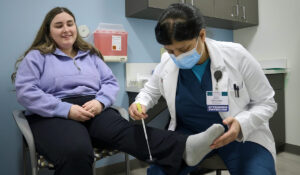
WashU Medicine-led trial evaluating investigational drug from Eli Lilly and Company aims to stop disease before symptoms arise
Can a Drug Prevent Alzheimer’s Disease Decades Before It Happens? (Links to an external site)
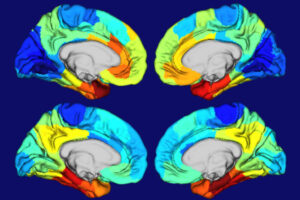
Scientists are testing an experimental anti-amyloid antibody in people expected to develop early-onset Alzheimer’s.
Fighting to Avoid Her Mother’s Fate, for Her Daughters’ Sake (Links to an external site)

New drug targets for Alzheimer’s identified from cerebrospinal fluid (Links to an external site)

Using cerebrospinal fluid (CSF) collected from living patients, a team of researchers at Washington University School of Medicine in St. Louis has for the first time linked disease-related proteins and genes to identify specific cellular pathways responsible for Alzheimer’s genesis and progression. Because these proteins were gathered from CSF, they are a good proxy for activity in the brain, and several of them may be potential targets for therapies.
Scientists Analyze Body Fluid to Find New Drugs for Disease (Links to an external site)

An analysis of cerebrospinal fluid has uncovered several proteins likely involved in the development and progression of Alzheimer’s disease.
The study, published in the journal Nature Genetics, identified more than a dozen proteins that represent potential targets for future drug therapies designed to treat the disease, shedding light on how genetics and proteins influence the neurodegeneration seen in Alzheimer’s.
Racial disparities in dementia determined by social factors (Links to an external site)

Racial disparities in dementia are due to social determinants of health, with genetic ancestry playing no role, according to a new study led by researchers at Washington University School of Medicine in St. Louis.
New Alzheimer’s Drug (Links to an external site)

Washington University Professor of Neurology Dr. Joy Snider joins the show to talk about the new Alzheimer’s drug that was approved by the FDA in July.
New Drug Approved for Early Alzheimer’s (Links to an external site)

The drug, Kisunla, made by Eli Lilly, is the latest in a new class of treatments that could modestly slow cognitive decline in initial stages of the disease but also carry safety risks.
‘A study to give us hope’: Lifestyle changes improve Alzheimer’s symptoms for some (Links to an external site)

Alzheimer’s drug adoption in US slowed by doctors’ skepticism (Links to an external site)
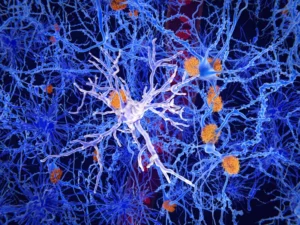
Alzheimer’s disease progresses faster in people with Down syndrome (Links to an external site)

Nearly all adults with Down syndrome will develop evidence of Alzheimer’s disease by late middle age. A new study by researchers at Washington University School of Medicine in St. Louis shows that the disease both starts earlier and moves faster in people with Down syndrome, a finding that may have important implications for the treatment and care of this vulnerable group of patients.
Moment of promise (Links to an external site)

Washington University is known the world over for being a leader in neuroscience research. And the university underscored its commitment to the neurosciences by building an 11-story hub on the Medical Campus that enables researchers to work more collaboratively and creatively. The goal: to accelerate the translation of science into treatments to help those living with neurodegenerative diseases.
Racial and ethnic disparities undermine dementia care in the US (Links to an external site)

A review of dementia research highlights unequal healthcare outcomes for Black and Hispanic people in the US
New Alzheimer’s drugs bring hope. But not equally for all patients (Links to an external site)

The medications have not been widely tested in Black people with the disease, underscoring stark — and persistent — disparities
Clues to preventing Alzheimer’s come from patient who, despite genetics, evaded disease (Links to an external site)

Alzheimer’s disease has plagued one large Colombian family for generations, striking down half of its members in the prime of life. But one member of that family evaded what had seemed would be fate: Despite inheriting the genetic defect that caused her relatives to develop dementia in their 40s, she stayed cognitively healthy into her 70s.
Researchers at Washington University School of Medicine in St. Louis now think they know why. A previous study had reported that, unlike her relatives, the woman carried two copies of a rare variant of the APOE gene known as the Christchurch mutation. In this study, researchers used genetically modified mice to show that the Christchurch mutation severs the link between the early phase of Alzheimer’s disease, when a protein called amyloid beta builds up in the brain, and the late phase, when another protein called tau accumulates and cognitive decline sets in. So the woman stayed mentally sharp for decades, even as her brain filled with massive amounts of amyloid. The findings, published Dec. 11 in the journal Cell, suggest a new approach to preventing Alzheimer’s dementia.
Lowering a form of brain cholesterol reduces Alzheimer’s-like damage in mice (Links to an external site)

…researchers at Washington University School of Medicine in St. Louis have found — in mice — that Alzheimer’s-like tau deposits in the brain lead to the accumulation of a form of cholesterol known as cholesteryl esters, and that lowering cholesteryl ester levels helps prevent brain damage and behavioral changes.
How do toxic proteins accumulate in Alzheimer’s and other diseases? (Links to an external site)
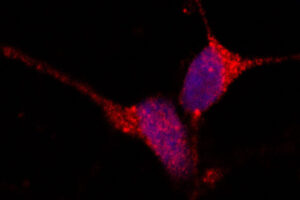
In search of ways to prevent these destructive tau tangles, researchers at Washington University School of Medicine in St. Louis have identified a key step in their development. Intervening at this step potentially could forestall the destructive cascade of events that results in brain damage, the researchers said. The findings are published Sept. 20 in the journal Molecular Psychiatry.
What to know about the new Alzheimer’s drug Leqembi (Links to an external site)

The Food and Drug Administration (FDA) recently gave full approval to Leqembi (lecanemab) for patients in the early stages of Alzheimer’s disease. Barbara Joy Snider, MD, PhD, answers questions about the drug.
Cognitive function in Down syndrome-associated Alzheimer’s focus of grant (Links to an external site)

NIH-supported study lays groundwork for Alzheimer’s clinical trials involving people with intellectual disabilities
Study defines disparities in memory care (Links to an external site)

Patients who live in less affluent neighborhoods and those from underrepresented racial or ethnic groups are less likely than others to receive specialized care for dementia, including Alzheimer’s disease, a new study from Washington University School of Medicine in St. Louis indicates. Further, the research shows that Black people are more likely than white people to be diagnosed with dementia at a later, more advanced stage, which could contribute to inequities in access to new treatments.
Tau-based biomarker tracks Alzheimer’s progression (Links to an external site)

Researchers at Washington University School of Medicine in St. Louis and Lund University in Lund, Sweden, have identified a form of tau that could serve as a marker to track Alzheimer’s progression. The marker also could be used by Alzheimer’s drug developers to assess whether investigational tau-based drugs – the next frontier in Alzheimer’s drug development – are effective against the disease. Such drugs theoretically would benefit people in later stages of the disease, when tau tangles play a crucial role.
Seeking Alzheimer’s clues from few who escape genetic fate (Links to an external site)

If researchers could uncover and mimic whatever protects these escapees, they might develop better treatments — even preventive therapies — not only for families plagued by inherited Alzheimer’s but for everyone.
Discovery of T cells’ role in Alzheimer’s, related diseases, suggests new treatment strategy (Links to an external site)

In Alzheimer’s and related neurodegenerative diseases, the brain protein tau is closely linked to brain damage and cognitive decline. A new study from researchers at Washington University School of Medicine in St. Louis indicates that T cells play a key role in tau-related neurodegeneration, a finding that suggests new treatment strategies for Alzheimer’s and related diseases.
Microglia-mediated T cell infiltration drives neurodegeneration in tauopathy (Links to an external site)

Microglia-mediated T cell infiltration drives neurodegeneration in tauopathy
Progress in Early Detection and Treatment of Alzheimer’s Disease (Links to an external site)

Neurologists discuss the major milestones in identifying biomarkers for detecting early Alzheimer’s disease over the past two decades.
Researchers call for clinical trial globalization in Alzheimer’s (Links to an external site)

Globalization of ADRD clinical trials has become a pressing need as 68% of the people living with ADRD will reside in low-middle-income countries (LMICs) by 2025.
Equity for African Americans in Alzheimer’s disease (Links to an external site)

For 20 years, the Knight Alzheimer Disease Research Center has worked to boost diversity in clinical trials.
US approves Alzheimer’s drug that modestly slows disease (Links to an external site)
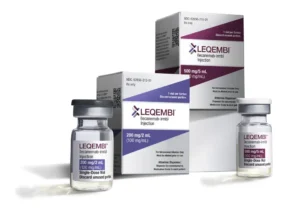
“This drug is not a cure. It doesn’t stop people from getting worse, but it does measurably slow the progression of the disease,” said Dr. Joy Snider, a neurologist at Washington University in St. Louis. “That might mean someone could have an extra six months to a year of being able to drive.”
Dare We Say Consensus Achieved: Lecanemab Slows the Disease (Links to an external site)

Randall Bateman of Washington University, St. Louis, presented the biomarker evidence, concluding that it indicates the treatment modified underlying biology. “These findings support the ability to change the course of Alzheimer’s disease,” he told Alzforum.
Roche Alzheimer’s antibody fails to slow cognitive decline in major test (Links to an external site)

Biogen Inc. and Eisai Co. caused a stir in September when they announced positive results in a late-stage trial for a closely watched Alzheimer’s drug, lecanemab. Doctors tempered their excitement, though, until they could scrutinize the full peer-reviewed data.
That data arrived Tuesday night. And while it is stoking enthusiasm that physicians might soon be able to offer patients a treatment that can slow the progression of the devastating disease, doctors need to carefully balance that optimism with safety concerns and the reality that the drug is far from a cure — and in fact, it’s hard to quantify how meaningful it might be for a given patient.
Roche Alzheimer’s antibody fails to slow cognitive decline in major test (Links to an external site)

The second (and third) time was not the charm for Roche’s experimental antibody drug for Alzheimer’s disease. The company last night announced gantenerumab had failed to show a statistically significant benefit in two large, late-stage clinical trials that tested its ability to slow patients’ cognitive decline—echoing a previous failure in another so-called phase 3 trial.
How Alzheimer’s Disease Research Is Helping Scientists Find Ways To Better Diagnose, Prevent, Treat, and Ultimately Cure Alzheimer’s (Links to an external site)

A new diagnostic tool by C2N Diagnostics is an important new tool for physicians in the evaluation of Alzheimer disease. It could pave the way for earlier diagnosis and treatment and greater enrollment in clinical trials.
Rejuvenated immune cells can improve clearance of toxic waste from brain (Links to an external site)

Researchers at Washington University School of Medicine in St. Louis have found an innovative way to improve waste clearance from the brain, and thereby possibly treat or even prevent neurodegenerative conditions. They showed that immune cells surrounding the brain influence how efficiently waste is swept out of the brain, and that such immune cells are impaired in old mice, and in people and mice with Alzheimer’s disease. Further, they found that treating old mice with an immune-stimulating compound rejuvenates immune cells and improves waste clearance from the brain.
What causes Alzheimer’s? Study puts leading theory to ‘ultimate test’ (Links to an external site)

Scientists are launching a study designed to make or break the hypothesis that Alzheimer’s is caused by a sticky substance called beta-amyloid. The study will give an experimental anti-amyloid drug to people as young as 18 who have gene mutations that often cause Alzheimer’s to appear in their 30s or 40s.
$9 million to fund study of ‘jumping genes’ in Alzheimer’s (Links to an external site)
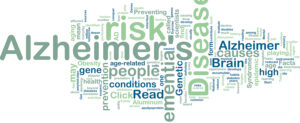
A five-year, $9 million grant from the National Institute on Aging of the National Institutes of Health (NIH) will fund research led by several investigators at Washington University School of Medicine in St. Louis and at the University of Texas at San Antonio to answer that question.
Better Cognitive Predictor in People at High Risk of Alzheimer’s Disease (Links to an external site)

The Alzheimer’s disease (AD) drug lecanemab’s recent success in Biogen’s Phase III clinical trials might have more to do with its effect in increasing levels of soluble amyloid-beta than in decreasing amyloid plaques in the brain, the findings of a new study published in the Journal of Alzheimer’s Disease on October 4, 2022, suggests.
Cruchaga awarded Zenith Fellowship Award (Links to an external site)

Carlos Cruchaga, PhD, the Barbara Burton and Reuben M. Morriss III Professor in psychiatry, is one of three Zenith Fellows selected this year and one of only 146 Alzheimer’s researchers chosen for the honor since it was created in 1991.
Washington University researcher finds Hispanic community more likely to develop Alzheimer’s (Links to an external site)

Dr. Jorge Llibre is a Washington University neurologist that researches Alzheimer’s. He says research shows the Hispanic community is two times more likely to develop Alzheimer’s or dementia than non-Hispanics.